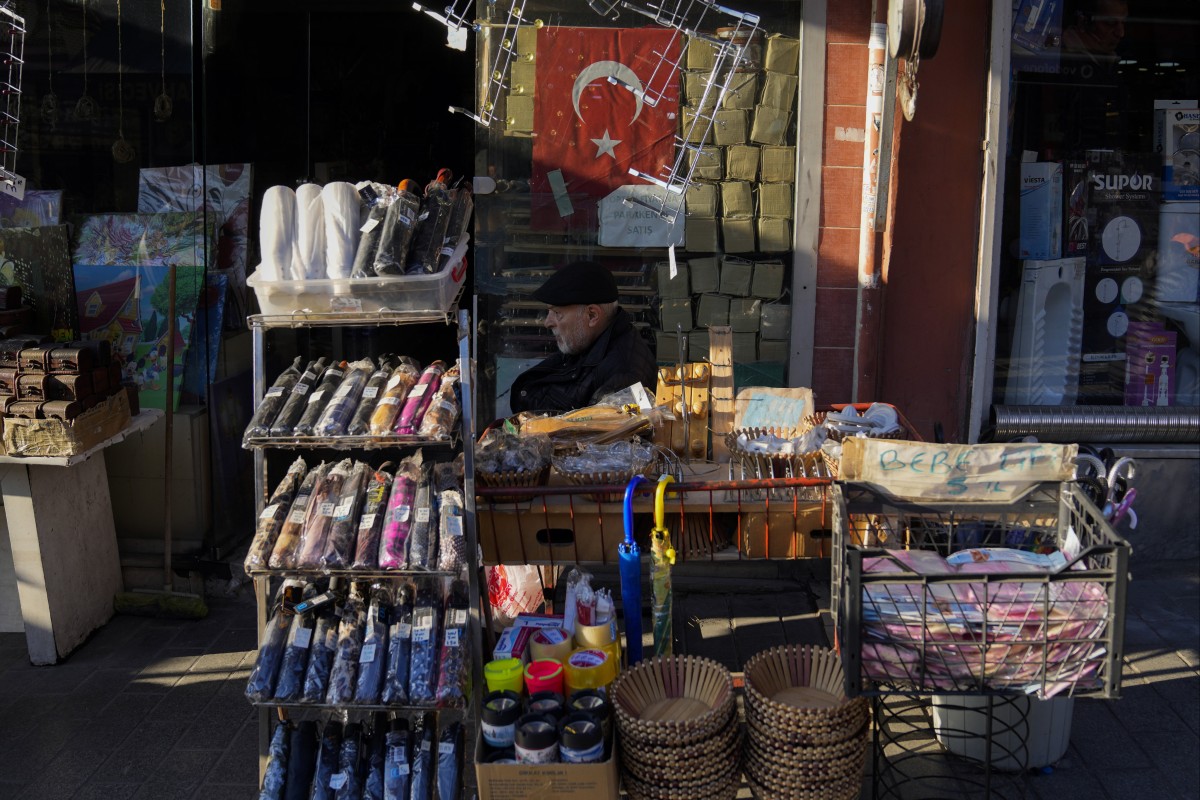
Cost-of-living crisis due to Russian invasion of Ukraine, Covid-19 remains biggest global risk
- Energy and food supply crunches will persist for the next two years and hurt efforts to battle long-term issues like climate change, experts say
- Natural disasters and extreme weather also risks to watch out for, as well as a possible recession
 A man sits in a market in Istanbul, Turkey on January 3, 2023. Inflation in Turkey showed a sharp drop in December, but is unlikely to bring relief to the many households suffering from the cost of living crisis. Photo: AP
A man sits in a market in Istanbul, Turkey on January 3, 2023. Inflation in Turkey showed a sharp drop in December, but is unlikely to bring relief to the many households suffering from the cost of living crisis. Photo: APThe cost-of-living crisis will be the biggest global risk over the next two years, a survey by the World Economic Forum warned on Wednesday ahead of its Davos meeting next week.
Global inflation remains at sky-high levels after energy and food costs skyrocketed last year following the invasion of agricultural powerhouse Ukraine by major oil and gas producer Russia.
Supply constraints caused by the Covid-19 pandemic have also contributed to decades-high consumer prices.
Minimum wage in Hong Kong to ‘rise by HK$2.50 to HK$40 per hour in May’ after 4-year freeze
“Conflict and geoeconomic tensions have triggered a series of deeply interconnected global risks,” said the study ahead of the WEF’s annual meeting of global elites in the Swiss Alpine village of Davos.
“These include energy and food supply crunches, which are likely to persist for the next two years, and strong increases in the cost-of-living and debt servicing.”
It added that such “crises risk undermining efforts to tackle longer-term risks, notably those related to climate change, biodiversity and investment in human capital”.
The survey, produced with consultants Marsh McLennan and Zurich Insurance Group, took into account the views of more than 1,200 global risk experts, policymakers and industry leaders.
The report described the cost-of-living crisis as the “biggest short-term risk” by 2025, followed by natural disasters, extreme weather events and “geoeconomic confrontation”.
“The short-term risk landscape is dominated by energy, food, debt and disasters,” said Saadia Zahidi, a managing director at the World Economic Forum (WEF).
“Those that are already the most vulnerable are suffering – and in the face of multiple crises, those who qualify as vulnerable are rapidly expanding, in rich and poor countries.”
The WEF study called “on leaders to act collectively and decisively, balancing short- and long-term views”.
And it concluded on the need for cooperation on strengthening “financial stability, technology governance, economic development and investment in research, science, education and health”.
Carolina Klint, a risk management leader at Marsh, said this year will be marked by “increased risks” related to food, energy, raw materials and cybersecurity that will further disrupt global supply chains and impact investment decisions.
“At a time when countries and organisations should be stepping up resilience efforts, economic headwinds will constrain their ability to do so.”
Many analysts warn that the global economy will suffer a recession in 2023 as inflation remains high.